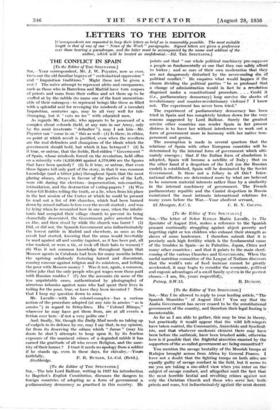• [To the Editor of THE SPECTATOR.] Sta,—The late Lord
Balfour, writing in 1927 his introduction, to Bagehot's English Constitution, discusses the dangers to foreign countries of adopting as a form of grovernment a. parliamentary democracy as practised in this country. He points out that " our whole political machinery pre-supposes a people so fundamentally at one that they -can safely afford to bicker ; and so sure of their own moderation that they are not dangerously disturbed by the never-ending diu n1 political conflict." He enquires what would happen if the chasm dividing the political parties "be so _profound that a change of administration would in fact be a revobation disguised under a constitutional procedure. . . . Could it (i.e., parliamentary democracy) long survive the shocks of revolutionary and counter-revolutionarY violence it I 'know not. The experiment has never been tried:"
The experiment of parliamentary democracy has been tried in Spain and has completely broken down for the very - reasons suggested by Lord BalfOur. Surely the greatest service other countries can render Spain in her present distress is to leave her without interference to work out a form of government more in harmony with her native tem- perament and genius.
The assumption is made in several quarters that the relations of Spain with other European countries will be - determined by the internal form of government which ulti- mately emerges ; that if the Italian form of absolutism is adopted, Spain will become a satellite of Italy ; that on the other hand if a despotism of the Left (on the Russian model) is established, Spain will be dominated by the Soviet Government. Is there not a fallacy in all this ? Inter- national affinities are determined more by what are believed to be common material interests rather than by a similarity in the internal machinery of government. The. French parliamentary republic and the Czarist despotism in Russia maintained the most intimate international relations for many years before the War.—Your obedient servant,






































 Previous page
Previous page